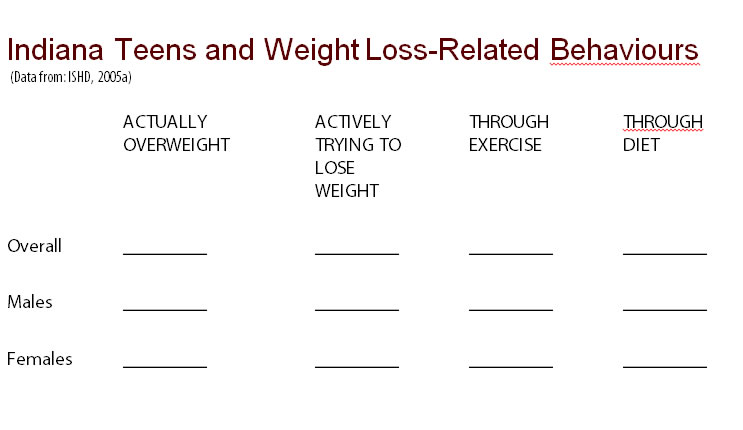|
STEP 1: COPY AND STUDY THIS AND TAKE A GUESS ON THE PERCENTAGES STEP 2: ASK MR. STEWART FOR THE ACTUAL NUMBERS STEP 3: WRITE A RESPONSE:
1) What is missing with this chart? 2) Were you surprised by these statistics? If so, what surprised you? If not surprised, how did these stats match up with your existing understanding? 3) What are the differences between males and females as demonstrated by this chart? 4) What are the similarities between males and females as demonstrated by this chart?
STEP ONE: Read this blog. http://www.rolereboot.org/life/details/2013-11-lets-talk-about-thin-privilege STEP TWO: Watch this response and (I can't believe I'm suggesting this), read the comments (most are actually pretty insightful.
STEP THREE: Write a 1/2 page written or creative response on this question: "Do you believe THIN PRIVILEGE and SKINNY SHAMING exist?"IF YOU WERE PRESENT DURING DENISE'S PRESENTATION: Write a short report identifying
IF YOU WERE NOT PRESENT DURING DENISE'S PRESENTATION: Research one of the following topics: the effects of bullying OR suggested anti-bullying campaigns 0 Comments In what ways are people different from each other?
PART 1 A. List three to five ways that people are different. B. Some things we can change through effort (by studying, practicing, etc.). C. Some things we can’t change, even if we want to D. Some things will change naturally over time whether we want them to or not PART 2 A. List three things that you are good at. Of these, what are you best at? B. List three things you need to improve upon. Of these, which one is most important to you? IF YOU WERE PRESENT DURING DENISE'S PRESENTATION: Write a short report identifying
IF YOU WERE NOT PRESENT DURING DENISE'S PRESENTATION: Research one of the following topics: development of Muskrat Falls on the Grand River in Labrador, being two-spirited, Labrador independence or activism issues in Canada. Complete the assignment above.
Complete the MUSIC LYRICS #1 sheet using a song from the POVERTY section of the listed website. Hold onto the other two sheets as we will use them in the Body Image Unit.
Growing up in a class society, we've all learned attitudes about others and ourselves that help perpetuate the class system. These questions will aid you in becoming aware of the oppressions and/or privileges you've experienced because of your background and how they affect your life now. Awareness is the first step in making a commitment to change. Money and Work
ASSIGNMENTPART 1:
Using SOME of these questions, write a 1-2 page report about yourself and your family's financial situation and class status. Like so much in this class, what you write is confidential. Make sure you use the terms we have learned in class. PART 2: Create a media piece on the same theme. Possible media can include video, collection of song lyrics, painting, cartoon panels, oral presentation, short drama, collage, short story, etc. Of course, if you have another creative idea, speak to Mr. Stewart. NOTE:This particular type of poverty is usually temporary as it involves a crisis or loss occurring. Events could include environmental disasters, divorce, major downturns in the economy or severe health problems. Examples could include:
A good example of situational poverty caused by an environmental disaster would be the destruction of New Orleans after Hurricane Katrina or forest fires in Northern Alberta. In both cases, many people were homeless, lost their jobs, and had nothing to their name. Since situational poverty usually has one specific cause, this type of poverty is most often temporary. Once the main problem has been addressed, the person's financial situation improves. For example, once a single mother finishes her schooling, she has a much greater earning power to help take care of her children. ACTIVITY1) You are broken into SIX groups: new immigrant to Canada, single person and single person with a child. In your group, choose a PRESENTER.
2) Go to MAKETHEMONTH.CA 3) Run through the scenario, each recording your SACRIFICES, STRESSORS, and SUCCESSES in a chart. 4) Write an overview of your experience and answer: Did you survive the month (including rent due tomorrow? 5) Hand in both the chart and overview. 6) Your presenter will share your experiences with the class. |
PURPOSEI will be posting your work here but please know this is NOT a correspondence course. Archives
January 2015
Categories |



 RSS Feed
RSS Feed